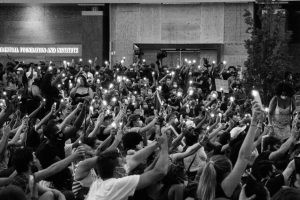Rules of engagement for targeted killings have been shrouded in secrecy. According to this legal expert, we still need more transparency.
David Cole is no stranger to the law. Besides teaching constitutional law, national security, and criminal justice at Georgetown University, he is also a volunteer attorney for the Center for Constitutional Rights, a regular legal correspondent for several major publications, and a widely published contributor to law journals. So it’s no surprise that on the issue of drones, Cole is able to identify the black, white, and gray areas surrounding our country’s use of the devices.
“Because drones make it so easy to kill, they make other alternatives seem unreasonable and infeasible,” he explains.
But just because it’s easy doesn’t necessarily make it right or wrong, and Cole does not condemn drone warfare as objectively immoral. What troubles Cole is the limited amount of information revealed about the program. “We know that killing is part of war. But we don’t know how they are defining the scope of this particular war,” he says.
Because human life—which Cole acknowledges as the foundational human right—is at the center of this controversial practice, Cole believes that Americans deserve to know the dirty details of what exactly is going on with their country’s drone program.
“You can’t get any of the political accountability, the legal accountability, the world accountability, until there’s transparency,” says Cole. “That’s the critical thing that we have to demand.”
What are drones, and how have they been used recently by the United States government?
A drone is just an unmanned aerial vehicle. They can be used for surveillance purposes. They’re remote-controlled aircraft, essentially, but they can also be loaded with a small bomb that can be used to target and kill individuals or groups.What are drones, and how have they been used recently by the United States government?
Drones have been used on the battlefield in Afghanistan to kill enemy fighters. They have been used in Pakistan, in particular, more than 300 times under the Obama administration to kill, by various estimates, somewhere between 3,000 and 5,000 people.
The target is sometimes an identified individual. Sometimes it’s a group. They have been used in Yemen to kill, most famously, an American citizen, Anwar al-Awlaki. They’ve been used in Somalia to kill alleged members of Al Shabaab, which is a domestic insurgency group there that the administration claims has ties to Al Qaeda.
What are some of the advantages to drones that make them an attractive option?
One advantage to killing somebody with a drone is that you don’t have to put American boots on the ground. You don’t risk the loss of American life. Drones are also, at least by government reports, capable of very precise targeting, and therefore you limit civilian casualties as compared, for example, to dropping a bomb.
As compared to an actual invasion, they are much more capable of targeting individuals and leaving those who are not targeted unharmed. In addition, in the heat of battle, troops are often caught up in the adrenaline of the fight and engage in atrocious activity. The distance that the drone provides may reduce the likelihood of that kind of wrongdoing.
But aren’t there some disadvantages as well?
Most broadly, drones make it too easy to kill. Drones reduce the disincentives to using lethal force to solve our problems, as opposed to using a variety of other tools we have at our disposal.
Before drones, if we thought somebody in Pakistan posed a problem for the United States, we would have to work with the Pakistanis. We would hope that they could capture that individual and bring him to trial. If we had charges against him for targeting United States citizens, we might seek his extradition. We might watch him. We might try to develop informants. We would be very disinclined to send American troops in to kill someone, unless he’s at the level of Osama bin Laden.
Most forms of lethal force, prior to drones, posed significant risk of casualties to people other than those whom the United States wanted to eliminate, including our own people, civilians in the place surrounding the targeted person, and security forces within that country.
Drones eliminate all that. A military or CIA officer can have breakfast with his family at home in the morning, go into the office, at lunchtime push a button and kill a human being, go home and have dinner with his family that night.
What is the reality of collateral damage from drone strikes?
Part of the problem with answering that question is that we don’t have great data. Because the United States hasn’t fully acknowledged the program, it doesn’t provide data on how many civilians have been killed. The figures vary from, say, 4 percent civilian casualties to 30 percent civilian casualties among various sources.
The reports are often based on sources in the tribal regions of Pakistan, where it’s very hard to get reliable numbers. Thirty percent civilian casualties is high, but some people would say that as compared to any other form of war, it’s actually not that high. All forms of war have substantial civilian casualties associated with them.
I think there probably are a significant number of civilian casualties, but there are two kinds of drone strikes. First there’s a personality strike, an individually targeted strike at a named individual who has been put on a kill list, and if those strikes have collateral damage, it’s likely to be relatively small.
But then there are signature strikes, where we don’t have the names of the people that we are targeting, but by virtue of their activity we conclude that they are militants, and we therefore kill that entire group. It becomes much more problematic when signature strikes are used in nonbattlefield situations.
Apparently the first drone strike after President Obama took office was in December 2009 in Yemen, based on intelligence that concluded that this was some sort of a meeting of terrorists. They struck it and killed 42 people, but it turned out to be a wedding. That underscores one of the risks here: on the one hand, you can have incredibly precise targeting, but at the end of the day your targeting is only as good as the intelligence that you’re using.
How is a personality strike different from an assassination?
Well, assassination is a loaded term. It generally connotes an illegal killing. We have an executive order signed by President Ford which prohibits extrajudicial assassinations after it was disclosed that in the ’70s the CIA was engaged in a number of plots to assassinate foreign leaders whom we didn’t like.
You might ask, then, how we distinguish what we’re doing today from that prohibition. What the administration would say is that prohibition remains in place, but an extrajudicial assassination is an illegal killing. They would argue that drone strikes are legal killings and therefore they are not assassinations, which sounds pretty semantic. I think most of us would agree, if there’s a hot battlefield and there’s an Al Qaeda contingent that has been identified on that hot battlefield and we use remote control weapons to kill fighters for Al Qaeda there, I don’t think anyone would call that an assassination. We would call that a lawful killing in an armed conflict.
The administration’s claim is that every drone strike, while they wouldn’t claim there have been no mistakes, was intended and understood to be a lawful killing, guided by whatever the rules are that they have determined make these killings lawful. It’s very circular.
How can we kill people in other sovereign nations, especially ones where we aren’t at war?
Well, the first thing I should say is there’s a tremendous amount we don’t know about the program and about the rules that govern it. What we do know we’ve been able to parse from a variety of speeches that President Obama and administration officials have given that have laid out some arguments for situations in which it might be justified to engage in a targeted killing.
So they say if we’re in an armed conflict, we can kill those who are fighting against us. I don’t think that’s controversial. Killing in wartime is regrettable, but it’s a part of war. It’s always been recognized as a legal tactic in war, unlike, say, torture, which is always illegal.
They would argue that the justification for killing the enemy isn’t limited geographically to a particular battlefield. So if Osama bin Laden, who is leading the fight against us, goes to Abbottabad, which is not on the battlefield, but he is the acknowledged leader of the enemy, he can be killed there. When you’re fighting an entity that makes cities their battlefields, that makes civilians their targets, you shouldn’t be constrained by this battlefield concept.
A second theory seems to be based on self-defense. The law of war has long recognized the right of a country to respond in self-defense to an armed attack and even to respond to an imminent armed attack. But the condition is that lethal force must be the last resort. If there’s no time or no other way to diffuse this threat than by lethal force, then it’s appropriate to use lethal force.
How can we define if a threat is imminent?
The administration says we define imminence in the modern world as this: If an individual is an operational leader of an organization and that organization has demonstrated its desire and willingness to target Americans, then by definition that individual poses an imminent threat always and forever. Therefore we don’t have to wait until there’s actually an attack underway or we have reason to believe that an attack is being plotted to use lethal force against that individual.
Anwar al-Awlaki for example, the American citizen whom we used a drone to kill in Yemen, was on the administration’s kill list for more than a year before he was actually killed. In theory, they could have killed him at any time over the year, and by definition, that is not imminent. The government has never made any claim that he was engaged in any plot at the time he was killed. He was driving from one place to another and we hit his vehicle with a drone and killed him; it wasn’t like the vehicle was armed or anything of that sort.
The current administration has redefined imminence in a very, very troubling way so that now lethal force is no longer truly a last resort. Because if in fact he’s not attacking us immediately, he’s not plotting to attack us, there’s not something underway, then over time it may become feasible to capture him, to arrest him, to try him, to use measures short of lethal force to avert the threat.
Besides last resort, can we apply other just war principles to our use of drones?
I’m not an expert on just war theory. My sense is that just war theory would be unlikely to be affected by the kind of weapon that is being employed. Concerns about when it’s appropriate to use force, under what conditions, avoiding civilian casualties, using proportionate means, only acting when necessary: All those principles would apply, whether you’re using infantry with bayonets or bombs or drones.
Some people argue it really isn’t any different from any other technological development. War has been fought from the time when people fought man to man with knives and swords. A catapult made it possible to kill from afar. Bows and arrows made it possible to kill from afar. Rifles make it possible. Planes with bombs make it possible to kill from afar. Cruise missiles make it possible.
Each one of these is just another development in tools of conflict. They may raise different concerns or iterations of policy questions, but they don’t fundamentally change the rubric that should govern when it’s appropriate to go to war and when it’s not appropriate to go to war.
But with drones, human beings can now kill by pushing a button, without risking their lives, in a way that’s deniable and can be unacknowledged, and so it is secret killing, essentially. I think this raises serious ethical concerns and raises the risk that we and other countries will resort to this tactic more and more.
What could happen if other countries gain access to drone technology?
I think one of the reasons it’s important that we have clear, transparent, and strictly defined rules for this kind of technology is that it’s only a matter of time before the rest of the world has it. There’s an arms race going on right now to develop drones in many other nations. I don’t think we would be very happy living in a world in which China, for example, could kill thousands of people in the surrounding region in an unacknowledged way on the basis of a secret policy that renders all of its killing lawful.
You can quickly imagine that practice leading to a much greater risk of conflict in the world at large. What we do sets a precedent for what other countries will do just because we’re first, and we’re the United States. If we wouldn’t be satisfied with China or Russia doing it, we shouldn’t be doing it.
How is it possible that there are so many secrets? Is Congress falling down on its job?
There was a story in the New York Times shortly after Obama was re-elected that said, seeing the possibility that he might lose the election and it might be President Romney, rather than President Obama, authorizing the button to be pushed on a drone attack, the Obama administration was working feverishly on creating a playbook for drones to govern this program going forward.
Once they won the election, the pressure to come up with a set of rules reportedly slackened. My response to that is, the deadline is not the election of another president; every time you push the button to take a human being’s life you should have at a minimum a set of rules to guide that.
Ordinarily, before we authorize the taking of human life, particularly where there is time to do so, we require some pretty rigorous processes. We usually require that the person has the opportunity to defend himself. Probably in most of these instances, that’s not possible.
We also usually require oversight from another branch. For example, if the White House wants to search a terror suspect’s backpack, it has to get a warrant from a court. If it wants to wiretap a terror suspect’s phone, it has to get a warrant from a court. But if it wants to just kill the terror suspect, it doesn’t go to a court at all.
How would you respond to people who say that our use of drones has increased anti-American sentiment and is actually raising the risk of terror against the United States?
I think that’s a very legitimate concern and it’s been articulated by people who are in a good position to know. Dennis Blair, who was the former director of national intelligence under President Obama, wrote an op-ed in the New York Times a few years ago saying we should stop drone strikes in Pakistan, putting aside all questions of legality. He thinks they are creating so much anti-American animus in Pakistan that in the long run is going to be much more dangerous, and so drones are counterproductive.
Gregory Johnsen, an expert on Yemen at Princeton, has said that when President Obama came to office there were around 300 members of Al Qaeda in the Arabian Peninsula (AQAP), which is the group in Yemen that we are concerned about and that Anwar al-Awlaki was said to have led. We have used over the last four years many, many strikes to kill AQAP leaders and others, but today, according to Johnsen, AQAP has something like 1,000 to 2,000 members.
If this tactic is viewed in those places where it’s been deployed as unfair, illegitimate, reflective of American exceptionalism, and the like, then it is likely to create the kind of backlash that will hurt us in the long run.
Now that we have drones, do you ever see a day where the United States doesn’t use them?
I think the answer to that depends on many factors, including, when there’s greater transparency, whether the American people and the world accept the rules or not. If there is a series of really big mistakes, like the killing of the wedding party in Yemen, that might cause some rethinking of the program.
Already the data suggests that although President Obama ramped up drone strikes, they have been used less aggressively this year. Now why is that? Maybe because there’s greater concern being expressed. Maybe it’s because they have killed enough leaders, or maybe it’s because they have concluded that the strikes are counterproductive. Again, because the program is largely unacknowledged, we don’t know the answer to these critical questions.
In the 1970s the CIA and the FBI were using informants and warrantless wiretaps to monitor peace groups, women’s groups, environmental groups, and civil rights groups. When that was disclosed, it led to public outcry and a ratcheting down of that power. So I think the future of drone use really depends on us.
How do we as Americans respond? If we as Americans say, “Yeah, go ahead, go for it,” then the power will continue to be deployed. If we as Americans and citizens of the world and other governments say, “Wait a minute, this raises some really serious ethical and legal issues. We need to put some serious constraints on this power or it will cause really very serious problems down the road,” then it’s possible that it would be constrained.
You’re not really arguing for doing away with drones.
No. Imagine a situation in which we would all agree it’s justifiable to kill. For example, let’s say that Osama bin Laden and Al Qaeda were planning the 9/11 attacks and were sending their people out, and Afghanistan had no interest in stopping them, and maybe they were even in the air.
I think most people would say it’s justifiable to use lethal force to stop that armed attack on the United States, even though it involves killing people.
If you accept that there will be circumstances in which it’s permissible to use lethal force, then is it better to use lethal force that has the potential to kill more civilians and puts our own soldiers at risk of losing their lives, or is it better to do it in a way that is surgical, that reduces civilian casualties and reduces the risk to our own people?
I think it’s pretty hard to make an argument that you should send troops out to possibly lose their lives when you have a tool that makes it possible to do the same job without this risk. I don’t think you can really be against the drone as such, but I think you can and should recognize that due to the ease of killing it creates, we must, as a moral and legal matter, put very tight constraints on its use and those constraints must be public.
Do you think that our government might ever use a drone to kill an American citizen in this country?
It’s not what keeps me up at night. I don’t think it’s likely. I think focusing on that misses where the real problem is. We have law enforcement capabilities at home that make resorting to that generally unnecessary.
There have been a lot of people arrested in the United States and brought to trial for plotting to engage in terrorist acts. We haven’t had to use lethal force against any of them. I don’t think it should be our central concern in thinking about this program going forward.
Do you think, though, that we need to treat American citizens differently overseas than we do other people overseas?
That’s a great question. I think that all human life is sacred and that taking human life should be restricted, regardless of what passport the person has. I tend to resist the distinction between a citizen and a noncitizen. In one respect, however, I think there may be a distinction, and that is this notion of unacknowledged killing.
There is something about the government, which is our representative, being able to kill its own citizens in a secret way that is deeply corrosive of a democracy. I don’t think that, in a war, we are required to acknowledge the killing of every enemy fighter that we have killed. There may be some moral and diplomatic reasons for doing so, where we can identify who the victims are. What’s the harm? But when it’s your own citizen, there is a democracy problem. You can’t have democratic accountability if you’re not willing to acknowledge what has happened.
Do you see a role for churches in this discussion?
I think there’s definitely a role for churches and other religious institutions, because I think virtually all religions respect the sanctity of human life, favor peace over war, and are concerned about human frailty and error. All of those concerns are directly raised by this tactic which makes it too easy for human beings to take other human beings’ lives, which I think increases the likelihood of war rather than reducing it.
If you imagine lots of countries doing what we’re doing and because human nature being what it is and human error being what it is, there will be many mistakes made. Therefore, it seems to me, any use of lethal force has to be tightly cabined to ensure that it’s not being used in unjustified circumstances.
The Catholic Church is opposed to capital punishment, right? But it is not opposed to all killing in wartime. This is somewhere in between. We don’t even know where it is in between because of the secrecy.
It certainly raises very fundamental issues that I think all religions care deeply about. Therefore, it would be good for churches, and other religions, to voice those concerns.
This article appeared in the September 2013 issue of U.S. Catholic (Vol. 78, No. 9, pages 26-30).
Read more about drone warfare in our web-exclusive sidebar from David Cole in “Drones, torture, and the value of public opinion.“













Add comment